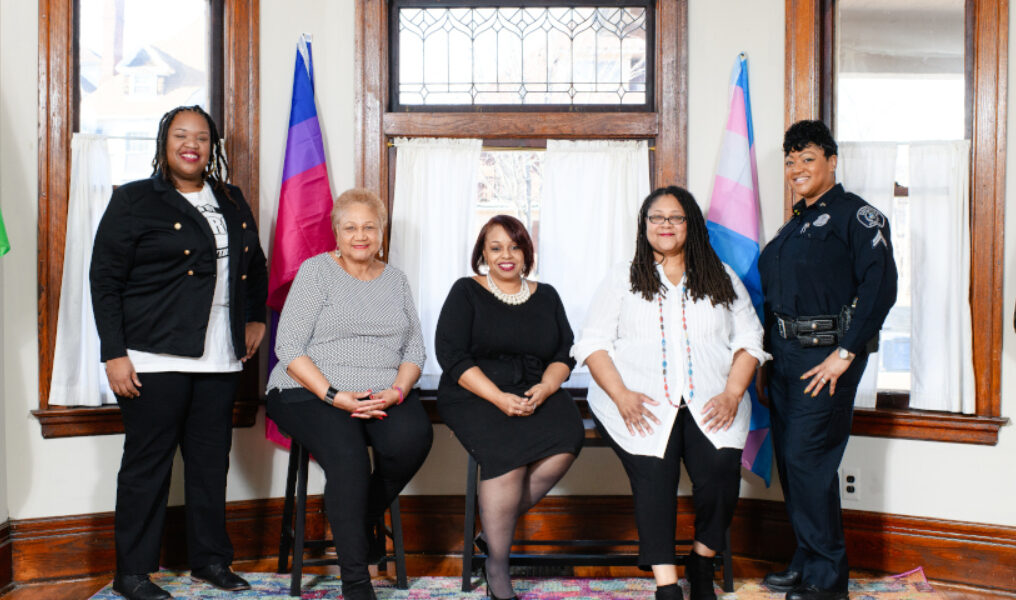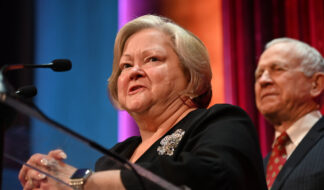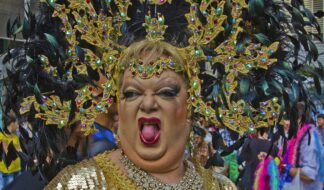Editor's Note: Due to concerns about the coronavirus, the 64th session of the U.N. Commission on the Status of Women and all associated events have been canceled. At the time of publication, organizers said that they will be working to host a similar event locally. This is a developing story.
In an unprecedented global stand for gender equality, September of 1995 marked the unanimous adoption of the Beijing Declaration and the Platform of Action by 189 countries. This historic act occurred at the United Nations' Fourth World Conference on Women and brought with it a series of objectives designed to aid equality. Among the 12 specific mandates, plans were outlined for dealing with issues like violence against women, the education and training of women, human rights of women, and women and armed conflict. Since then, the U.N. has reconvened every five years to assess its progress with its global goals and outline future plans for advancement.
Now, in 2020, the organization is due for another assessment, and thanks to a partnership between the Bell Global Justice Institute and The Ruth Ellis Center, a team of five Detroit women of color will have a chance to be a part of this global women's advancement initiative. On March 18, the group of various professionals will host a parallel event panel discussion titled Promising Practices for Beijing+25: Strengthening Visibility for Women of Color. In advance of the trip, BTL met up with each of the participants to learn more about their individual activism, goals for the upcoming event and what they hope to learn.
London J. Bell — Founder and President of the Bell Global Justice Institute
Named for her brother, Marine Corps. Staff Sgt. Vincent James Bell, London Bell founded the Bell Global Justice Institute in an effort to advance acts of service.
"We aim to teach, inspire and empower youth and young adults to use local, national and international mechanisms of advocacy to advance their grassroots activism," reads the organization's mission statement.
Today, the organization has done various acts of activism like being involved in voter registration and education drives, raising awareness about life with disabilities and partnering with the U.N. to expand awareness about its work. Bell said that it was 2018 when both the Institute and REC first submitted a proposal to create a parallel U.N. event for last year.
"Our focus was the social determinants of health regarding trans women, particularly trans women and girls of color," she said. "… We talked to a global audience. There were about 50 people in the room. We spoke to them about creating more affirming and safe spaces around the world for trans women."
After the success of that event, Bell said that the timing was perfect to bring a group together to discuss increasing the global visibility of women of color.
"For me, I believe that it's really important that women of color are at the table when there are policies being written — whether it be in the board room of NGOs or businesses or state and local law policy or even federal government and even in international arenas," Bell said.
In addition to being a woman of color herself, Bell has a disability. She will be using her platform to address the value of showcasing women experiencing different intersectionalities.
"Because I often feel left behind in spaces. And often times when I'm speaking up I feel like I'm speaking up by myself," Bell said. "And I want to make it known that it is important that we are influencing international policies like the Beijing Declaration and Platform of Action and that we are considering the intersectionality of all women and girls when doing so."
In addition to speaking out with the panel at the parallel event, Bell said she's excited to attend other similar events to learn of ways she can further the conversation both internationally and at home.
"This is really our opportunity to be a part of that global conversation and it's connecting the local and global together. And I'm very excited. It's a wonderful opportunity, I believe, for all of us," she said. "I am particularly excited to be able to gather such a dynamic group of women who are incredibly busy, who have expertise [in their fields]; I'm excited for all of us to be there."
Pamela E. Alexander — Deputy Director of the Ruth Ellis Center
The Ruth Ellis Center is a nonprofit organization named after an African American lesbian who worked to provide housing and accepting spaces for LGBTQ people in Detroit. Today, REC works to aid homeless and at-risk LGBTQ youth in the city. In her role, Alexander specializes in work with youth, families and program development. Recently, she had a hand in the development of the Kofi House — a REC-sponsored safe space that specializes in providing resources for lesbians and queer young women.
Alexander said that although REC has sponsored trips to the UN before, this one stands out.
"This trip is different, because this is a panel of women of color who are focused on sharing best practices in addressing the health, well-being and safety of women of color in their local communities, across the country and globally," she said. "We wanted to make sure we selected professional women of color from a cross spectrum of fields [to participate], from the arts, community policing, Lesbian/Queer Center, abilities and health and wellness."
When asked, Alexander said she's eager to learn from other attendees at the parallel event and beyond how REC's resources may be used locally and nationally. She said that although progress has been made to meet the Declaration's mandates, there's still much work to be done.
Alexander pointed to addressing causes of poverty and increasing access to educational opportunities and health care as methods to strengthen existing methods to meet mandates.
"I believe the global community is working toward the objectives of the Beijing Declaration, and I believe the U.S. needs to do more to ensure safety and improve health outcomes for women of color," she said.
Cpl. Dani Woods — Chief Neighborhood Liaison Unit of the Detroit Police Department
Dani Woods is a corporal who has been working as the Detroit Police Department's LGBT Liaison since 2013. In her role, she works to build trust and understanding between the city's LGBTQ community and the Department. She has partnered with organizations around Metro Detroit like the Ruth Ellis Center, Affirmations, LGBT Detroit and more. Woods also serves on an advisory board dedicated to listening to the concerns of LGBTQ civilians in the city. Woods said that when Bell reached out to her to participate in the panel, she was honored.
"That platform is huge, so I'm happy to be a part of it," Woods said. "And with the whole premise of the invisibility of women in certain spaces, my particular portion is kind of the flip side of what happens when women are visible in these spaces — no matter your identity, orientation, ethnicity and all of those things."
Woods added that her intersectional identities as an openly lesbian, African American police officer coupled with the other panelists will provide for an enriching discussion. Speaking from her perspective as a police officer, Woods said that when she takes stock over the last 25 years she can see a definite level of progress gained for women's equity in the U.S.
"I say that because women are no longer as timid or as shy or as apprehensive in speaking up," she said. "When we talk about women in health, there are more women in certain places and they're visible here in the U.S. Even in our police department, out of every police department in the nation, we have the most women in leadership roles."
Woods also said she noticed definite increases in the number of women in politics and those women who feel empowered to leave abusive relationships. Still, despite that push forward, Woods is aware that there is more work to be done.
"So, I want to say we've arrived, but we've been here but just [now] not as behind the scenes as we were before," she said. "I'm always looking to see how other practices and cultures in other countries, and I'm always interested in developing a [work] partnerships."
Woods said that in 2016 she attended the Proud to Be Your Friend World LGBT Conference in Toronto. There, she learned of inclusive programs created by law enforcement officers around the world. One that stood out was a transgender-inclusive resources agreement between English law enforcement and LGBTQ advocates.
"[It's] specifically for those that are doing survival sex work, which was like, ‚ÄòWait. What?' I couldn't believe it. I brought home the literature and I'm still combing through it, but it really was an eye-opener," Woods said. "Because you can arrest people all day long for a crime, but where is the real rehabilitation? Where is the help? Because just arresting someone and getting them off the street, well, when they get out guess what they're going right back to. … Hopefully, this [panel] will help improve and implement and improve programs here. I'm just excited to be a part of it all."
Deidre "D.S.SENSE" Smith — Founder of the On My Detroit Everything Movement
Deidre D.S. SENSE Smith is a poet, musician, activist and the founder of the On My Detroit Everything movement that encourages pride in Detroit and speaking up for onesself. Within that movement, Smith hosts workshops titled SYMMYNS, which stands for Speak Your Mind, Mind Your Speech.
"And in those workshops, under that initiative, what I do is I educate youth, and girls especially, through the elements of hip-hop in community building, community outreach, restorative justice and transforming a conflict," Smith said. "So, London saw that it would fit for me to also be a part of the panel discussion at the U.N., and I'm forever grateful to her for that."
For a period of four years, Smith worked with the Ruth Ellis Center as a youth specialist where she worked with at-risk and runaway youth in the foster care system. She said that her program, that focused on inclusion, healthy expression and communication, aided a drop in "conflict, suicide attempts and self-harming."
"I wanted them to understand how important their presence is," she said.
Because of the program's success, this is not the first time Smith has been asked to share her knowlege with people outside the Metro Detroit area. In 2018, Smith joined a group from The University of North Carolina at Chapel Hill called Next Level in Cartagena, Colombia, where she taught a similar class.
"And I was so proud to see so many young women in my classroom raging, talking about their woes, talking about their triumphs, talking about their businesses. That really spoke to me, because now here I was outside of Detroit seeing that there were women just like collectives I've been a part of here in Detroit," Smith said.
Smith said that the point she hopes to emphasize the most on the upcoming panel is the value of sharing one's voice — particularly as a woman of color.
"As a black woman the most important thing you have is your voice. We're often in arenas where our ideas, our inputs aren't considered. … I think this discussion is important, and these five black women that are attending and holding this discussion are important because our voices will be heard," she said. "But I really want to drive home the importance of freedom expression and the sharing of narratives through art."
Famika Edmond — Founder of For The Love Of H.E.R.
Over the past year Famika Edmond saw a need for women in Detroit to not only have a safe space but a supportive one, too. That's why she founded For the Love of H.E.R. (Healing, Empowerment, Resilience) — a workshop intended to empower black women of all ages and provide "necessary tools for self-esteem, self-improvement, and self-awareness."
The five-week program achieves this by allowing participants to examine their own lives and assess their barriers to both personal and professional growth.
"Participants then learn strategies to heal and create new and empowering stories," Edmond said. "… We also want women to recognize the leadership that they possess inside of them. My goal is to empower black women to advocate for themselves, whether it be relationships, career and/or health."
When approached by Bell to participate in the parallel event, Edmond said that she was immediately excited. Her focus on the panel will primarily be on health care.
"I would like to bring awareness to the stigmas and how often they are correlated and interrelated, the health impact of intersectional stigma, which is complex, generating a broad range of vulnerabilities and risks for women and girls," she said.
In addition to giving her a platform to draw attention to issues of visibility, Edmond said that having a global reach will be a welcome way for her to gain insight and information on how to improve the circumstances of the women who participate in her program locally. Ideally, she said, the panel will provide her with ideas and tools to strengthen For the Love of H.E.R. that can be shared with other local organizations, too.
"I do feel that there have been strides that have happened in the global community but there are still areas for improvement. We have to look at why with certain demographics, they are still facing social and health disparities. Until we address systematic racism and stigmatization, we still have work that needs to done," she said. "My hopes are that knowledge that I gain from participating on this panel, I can bring back what I have learned to my community. I feel it will give me more awareness of global issues that may be impacting other women and girls that I am not aware of."










